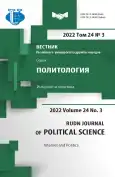Политика в цифровом формате в исследованиях российских и зарубежных ученых: представляю номер
- Авторы: Володенков С.В.1
-
Учреждения:
- Московский государственный университет имени М.В. Ломоносова
- Выпуск: Том 24, № 3 (2022): Интернет и политика
- Страницы: 339-350
- Раздел: РЕДАКЦИОННАЯ СТАТЬЯ
- URL: https://journal-vniispk.ru/2313-1438/article/view/322602
- DOI: https://doi.org/10.22363/2313-1438-2022-24-3-339-350
- ID: 322602
Цитировать
Аннотация
Приглашенный редактор номера, профессор кафедры государственной политики факультета политологии МГУ Сергей Володенков, признанный специалист в области теории политических коммуникаций в интернет-пространстве, технологий манипуляции и пропаганды в современном информационном противоборстве, управлении общественным сознанием, проблем национальной информационной безопасности и гибридных войн представляет тематический номер, посвященный феномену цифровизации политических процессов и цифровой политике в целом. Цель номера - продемонстрировать достижения российских политологов, разрабатывающих оригинальные подходы и работающих в коллаборации с зарубежными учеными в области политической коммуникативистики, и показать линии наиболее выраженного исследовательского напряжения.
Об авторах
Сергей Владимирович Володенков
Московский государственный университет имени М.В. Ломоносова
Автор, ответственный за переписку.
Email: s.v.cyber@gmail.com
ORCID iD: 0000-0003-2928-6068
доктор политических наук, профессор кафедры государственной политики факультета политологии
Москва, Российская ФедерацияСписок литературы
- Astashkin, A.G., & Bresler, M.G. (2018). Social media in the structure of modern network communication. Proceedings of Kazan University. Humanities Series, 160(4), 814–822. (In Russian).
- Beer, D. (2017). The social power of algorithms. Information, Communication & Society, 20(1), 1–13. https://dx.doi.org/10.1080/1369118X.2016.1216147.
- Bolsover, G., & Howard, P. (2017). Computational propaganda and political Big Data: Moving toward a more critical research agenda. Big Data, 5(4), 273–276. https://dx.doi.org/10.1089/big.2017.29024.cpr.
- Borgesius, F.J.Z. (2020). Strengthening legal protection against discrimination by algorithms and artificial intelligence. The International Journal of Human Rights, 24(10), 1572–1593. https://dx.doi.org/10.1080/13642987.2020.1743976
- Collington, R. (2021). Disrupting the welfare state? Digitalisation and the retrenchment of public sector capacity. New Political Economy. Retrieved November 25, 2021, from https://www.tandfonline.com/doi/full/10.1080/13563467.2021.1952559
- Gerbaudo, P. (2018). The Digital Party: Political organisation and online democracy (Digital Barricades). London: Pluto Press.
- Isaev, I.A. (2021). “Power machine” in virtual space (image formation. Moscow: Prospect Publ. (In Russian).
- Kosinski, M., Matz, S.C., Gosling, S.D., Popov, V., & Stillwell, D. (2015). Facebook2 as a research tool for the social sciences: Opportunities, challenges, ethical considerations, and practical guideline. American Psychologist, 70(6), 543–556.
- Kuzheleva-Sagan, I.P. (2022). Social networks as a space for the implementation of strategic communications and waging memetic wars. Communicology,10(1): 65–79. https://doi.org/10.21453/2311-3065-2022-10-1-65-79 (In Russian).
- Lovink G. (2019). Critical theory of the Internet. Moscow: Ad Marginem Publ. (In Russian).
- Malkevich, A.A. (2019). Social media as a factor in the political socialization of young people: From hierarchy to a network model. Moscow University Bulletin. Series 12. Political Science. (6), 88–97.
- Nazarov, M.M. (2020). Platforms and algorithmization in media: Content and social consequences. Communicology, 8(2), 108–124. https://doi.org/10.21453/2311-3065-2020-8-2-108-124. (In Russian).
- Odintsov, A.V. (2017). Sociology of public opinion and the Big Data challenge. Monitoring of Public Opinion: Economic and Social Changes, 3, 30—43. https://doi.org/10.14515/monitoring.2017.3.04 (In Russian).
- Rezaeva, A.V. (Ed.). (2020). Artificial Intelligence on the Way to Artificial Sociality: New Research Agenda for Social Analytics. Moscow: VTsIOM Publ. (In Russian).
- Samsonova, E.A. (2020). New media — a new picture of the world (to raise the question of the social network picture of the world). Medi@llmanah, 4(99), 18–24. (In Russian).
- Smorgunov, L.V. (2019). Participatory governability: Platforms and collaboration. Vlast, 27(5), 9–19.
- Srnichek N. (2020). Platform Capitalism. Moscow: HSE Publishing House. (In Russian).
- Sunstein, C.R. (2001). Echo chambers. Princeton: Princeton University Press.
- Van Dijck, J., de Winkel, T., & Schäfer, M.T. (2021). Deplatformization and the governance of the platform ecosystem. New Media & Society. Retrieved November 25, 2021, from https://journals.sagepub.com/doi/full/10.1177/14614448211045662
- Zuboff, S. (2019). The age of surveillance capitalism: The fight for a human future at the new frontier of power. New York: Public Affairs.
- Vidnaya, O.E., & Merkushina, E.A. (2021). Parameters of youth media socialization: modern angle. Znak: problemnoe pole mediaobrazovanija, 4(42), 94–104. https://doi.org/10.47475/20700695-2021-10411 (In Russian).
- Volodenkov, S.V, & Artamonova, Yu.D. 2020. Information capsules as a structural component of contemporary political internet communication. Vestnik Tomskogo gosudarstvennogo universiteta. Filosofiya. Sotsiologiya. Politologiya — Tomsk
- State University Journal of Philosophy, Sociology and Political Science, 53, 188–196. https://doi.org/10.17223/1998863Х/53/20
Дополнительные файлы









